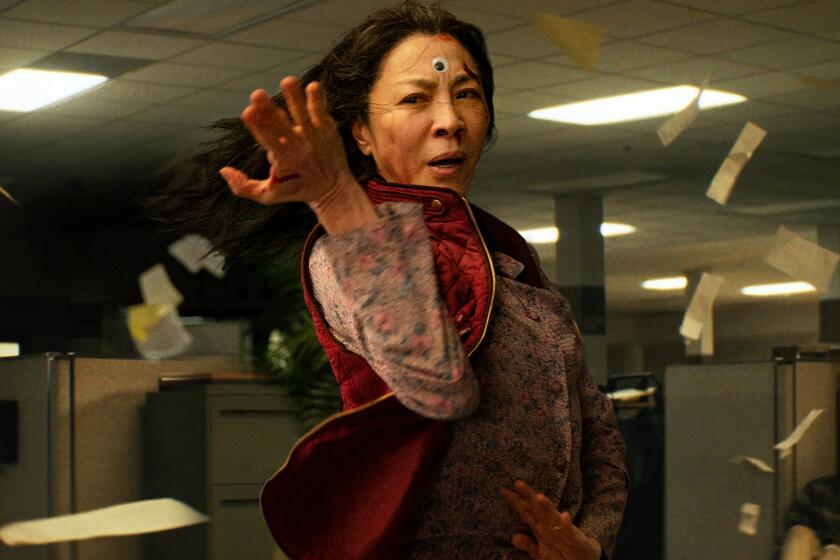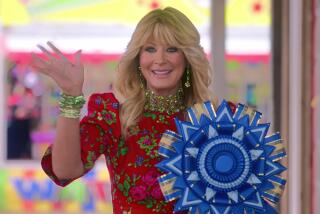In ‘Beef,’ Ali Wong and Steven Yeun explore the underpinnings of road rage
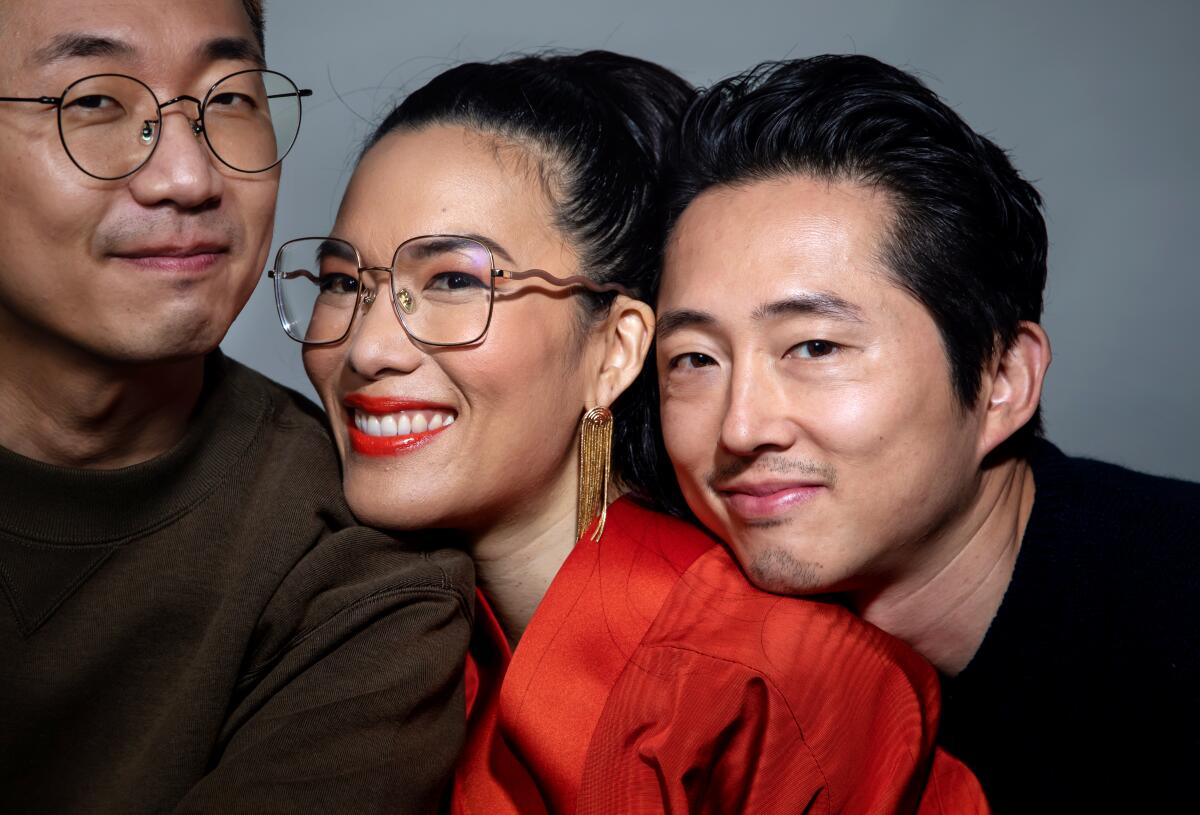
- Share via
It all began at a stoplight in Hollywood a few years ago.
Lee Sung Jin took a few seconds to start moving when the light turned green. The driver behind him responded with disproportionate rage, honking and cursing maniacally, so Lee decided to follow him across town and onto the 10 — which happened to be the direction he was going anyway.
“I justified it by saying, I’m just going to commute home,” Lee recalled. “He must have thought, ‘Oh, this lunatic is following me for the whole run of the highway.’ That’s what made me chuckle in my mind: You never know what someone else is going through or what the true nature of the internal state is.”
Daniels, the directors of ‘Everything Everywhere All at Once,’ reveal the inspirations behind the wildest ideas in their maximalist action movie.
The encounter inspired “Beef,” a 10-episode series following the ugly aftermath of a road rage incident between two Angelenos from opposite ends of the socioeconomic divide, played by Ali Wong and Steven Yeun.
Created by Lee and produced by A24, the studio behind this year’s Oscar juggernaut “Everything Everywhere All at Once,” the series defies easy categorization. A twist-filled, darkly comic thriller about class struggle, the lingering scars of childhood, second-generation immigrants and the daily absurdity of life in Los Angeles, it is layered with eclectic cultural references from angsty Y2K rock — Hoobastank fans, now is your moment — to 16th century Dutch painting and Werner Herzog.
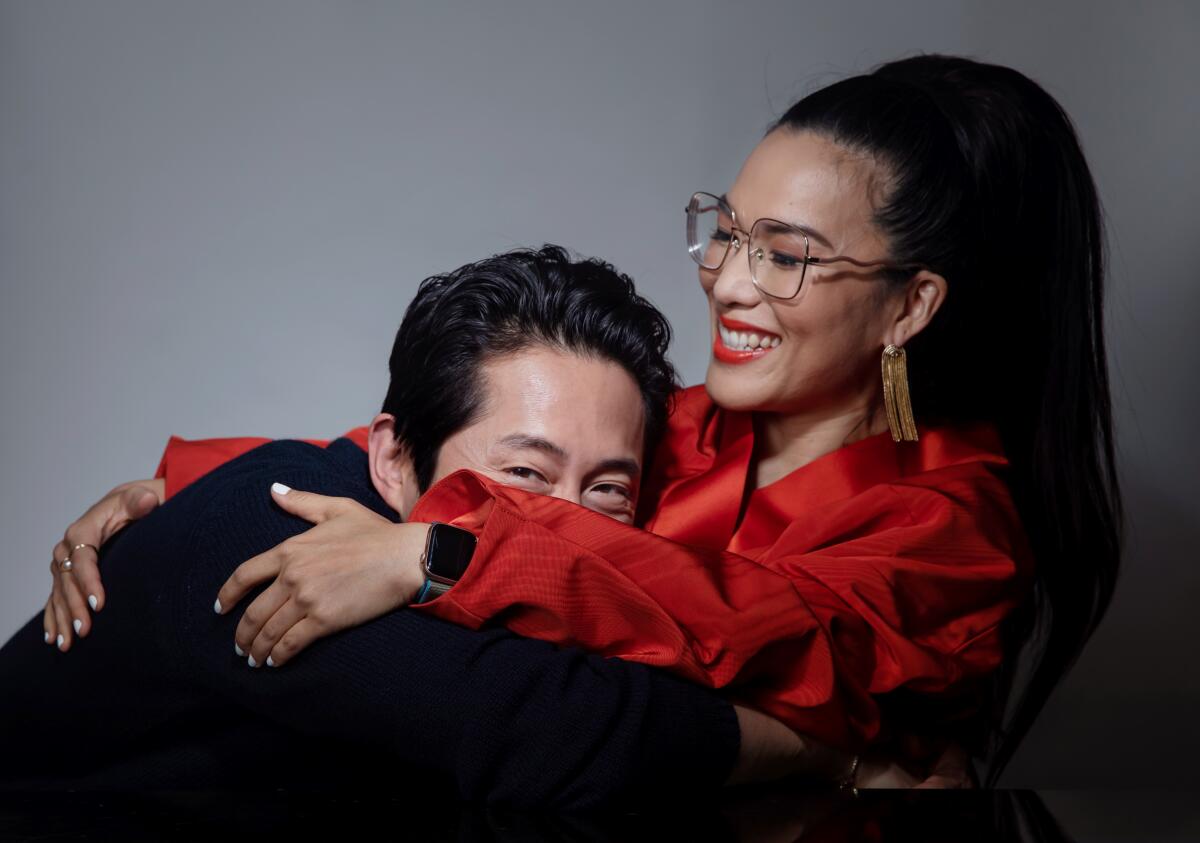
And it all begins in the parking lot of a big-box retailer, where Danny (Yeun), a struggling contractor who seems destined to fail at everything — even suicide — nearly backs his beat-up pickup truck into a white Mercedes SUV driven by Amy (Wong), a tensely coiled entrepreneur who has a seemingly perfect life. The showdown triggers a mutual quest for revenge that spirals out of control and ultimately reveals how much Amy and Danny actually have in common despite their ferocious antipathy for each other.
“At the core, whether they know it or not, they’re both struggling with the same thing, which is this existential void that feels unfillable,” said Lee, who had worked with Yeun in the Netflix animated series “Tuca & Bertie” and was looking for another way to collaborate. He pitched Yeun his idea for a series exploring the psychological underpinnings of road rage.
Yeun, who recalled an hours-long conversation with Lee that started with antagonistic motorists and eventually led to God, was intrigued by what he called “the Spider-Man meme of it all.”
“I am conscious of the idea that when I’m mad at someone, all the projections I put on that person are a weird reflection back at [myself],” he said. “And that’s what usually stops me from engaging further. I’m like, ‘Oh, I’m just telling on myself.’”
Danny’s frustrations are not hard to understand: Well into his 30s, he lives in a rundown apartment with his younger, crypto-obsessed brother, Paul (Young Mazino), still holds a torch for his high school girlfriend and has strayed from the church that once provided guidance. He is also determined to make enough money to bring his parents, who were forced to return to South Korea after their motel was shut down by the police, back to the United States.
Danny is “really trapped in this narrative that everyone’s out to get him,” said Yeun, in a joint interview with Wong. Both are executive producers on the series. “The last straw is this white Mercedes, honking at him for an abnormally long time, flicking him off for doing nothing.”
Some of the details of Danny’s life are drawn from Yeun’s experiences as a self-described “immigrant latchkey kid” with ties to the church.
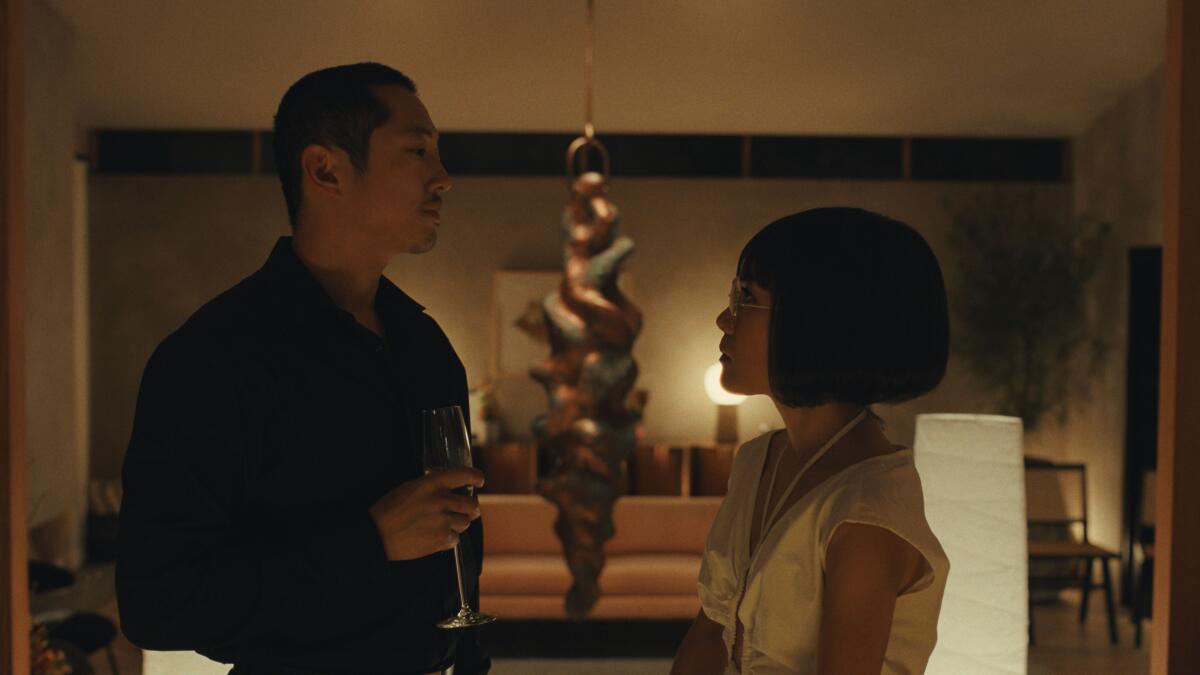
“What was difficult for me was facing the shame of Danny, making sure I never abandoned Danny, even though I wanted to judge him,” said Yeun, who was nominated for an Oscar for his role in “Minari,” a very different story about Korean immigrants. “I can also be Danny. And I have also been Danny. I’ve had these moments in my life that from the outside could be judged as pathetic, gross or ugly. I had to be like, ‘Never bail on Danny.’”
Wong’s Amy is more successful by every conceivable metric: She is married to the handsome, doting George (Joseph Lee), has an adorable daughter, June (Remy Holt), lives in a pristine minimalist home and has built her chic plant shop into a major lifestyle brand. But she carries profound but unexpressed resentment over being the family breadwinner while also shouldering much of the parenting burden.
“She is stuck in a maze of her own creation,” said Wong. In a telling moment in the pilot, Amy pulls into the garage and receives a flurry of urgent text messages about her job, child and house. “As women, we all have that moment where we’re just, like, bombarded. There’s always something, right? But what if there’s like 10 things at once?” (Like Wong, Amy has Vietnamese and Chinese heritage.)
Wong’s quietly seething performance as Amy — complete with a rictus grin and an armor-like wardrobe of shapeless neutrals — marks a departure for her, a comedian known for bawdy stand-up specials including “Baby Cobra” and “Hard Knock Wife” and the breezy rom-com “Always Be My Maybe.” It required her to masturbate with a gun, do her first on-camera sex scene, memorize long monologues that were to be recited in a single take and shoot action sequences in the wilderness. “I felt like Shelley Long in ‘Troop Beverly Hills,’” joked Wong, contrasting herself with Yeun, who rose to fame running from zombies on “The Walking Dead.” “He’s used to having blood and dirt kicked in his face at 6 in the morning.”
Wong drew inspiration from a different but equally fraught form of travel: flying. She recalled a time when, as a struggling stand-up comic early in her career, she was in a rush to catch an early-morning flight home and forgot to take a water bottle out of her luggage. When security pulled her aside for a pat-down, she began weeping — not because of the poor TSA agent doing their job but because of everything leading up to that moment. “It was not misplaced anger but misplaced sadness,” she said.
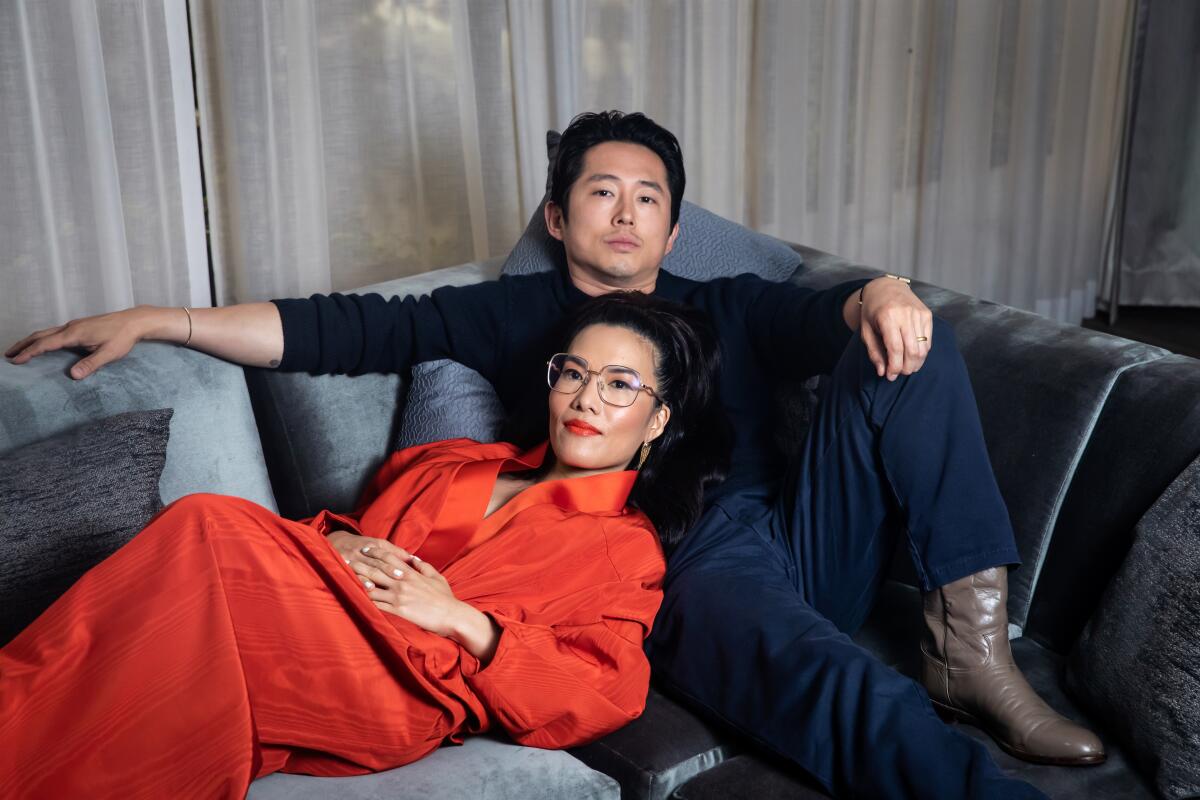
Because so much of “Beef” is about the assumptions Danny and Amy make about each other, the characters don’t actually share that many scenes together — yet there’s palpable tension between them. Lee likened the writing of their relationship to a musical chord progression that creates longing in the audience. “It’s undeniable, once they’re together, that their chemistry is electric,” he said.
Lee’s own road rage incident involved a middle-aged white man, and he’d originally envisioned Yeun’s character clashing with “a Stanley Tucci type.” Early in the development process, he was catching up with Wong, who also starred in “Tuca & Bertie.” As he listened to her “talking about a lot of the harsh truths of life in such a funny, digestible way,” Lee had an idea: Maybe it would be more interesting if she played Danny’s nemesis?
Having two Asian American leads allowed the story to unfold in ways that wouldn’t have been possible in a show about a vehicular confrontation with a white man, said Lee. ”It doesn’t remove the race card, but it pivots it in a very interesting way and opened it up. And it allowed me to home in on the main existential themes, while letting the specificities of these people start to organically bring up some Asian American identity [issues].”
“When you have a predominantly Asian American cast, which is very rare, all the people get to be people,” Wong said. “So when you reference who your favorite character is, you won’t say, ‘Oh, it’s the Asian one.’”
While road rage has risen across the country, particularly since the pandemic, the inciting incident in “Beef” may feel especially relatable to Angelenos. Infused with a strong sense of place, both culturally and geographically, “Beef” captures the city in its many permutations, from the moonlit canyons to the clogged freeways. Parts of the series were filmed in Koreatown, including the nightclub Arena. Shooting on location “just adds something to the performances,” Lee said, “because there’s an authenticity to everything.”
Much of the drama centers in the Valley, from the tony climes of Calabasas, where Amy lives, to Danny’s modest corner of Reseda. It’s all personal to Lee, who bought a house in the Valley a few years ago and would often find himself running errands at the Home Depot in West Hills. He was struck by the extent to which the store was “a hub for the economic divide.”
“You have people from Hidden Hills and Calabasas but also from Reseda and Chatsworth, all descending on the same place to get supplies, but there couldn’t be much more of a gulf between their social statuses,” Lee said. “Those parking lots feel like a bomb waiting to go off sometimes.”
Amy and Danny’s parking-lot altercation is explosive, but “Beef” makes it difficult to pick a side — and that’s the point. “I hope that when audiences watch the show,” said Wong, “it’s not going to be a landslide for any one team.”
‘Beef’
Where: Netflix
When: Anytime, starting Thursday
Rating: TV-MA (may be unsuitable for children under the age of 17, with advisories for violence, sex and coarse language)
More to Read
The complete guide to home viewing
Get Screen Gab for everything about the TV shows and streaming movies everyone’s talking about.
You may occasionally receive promotional content from the Los Angeles Times.
